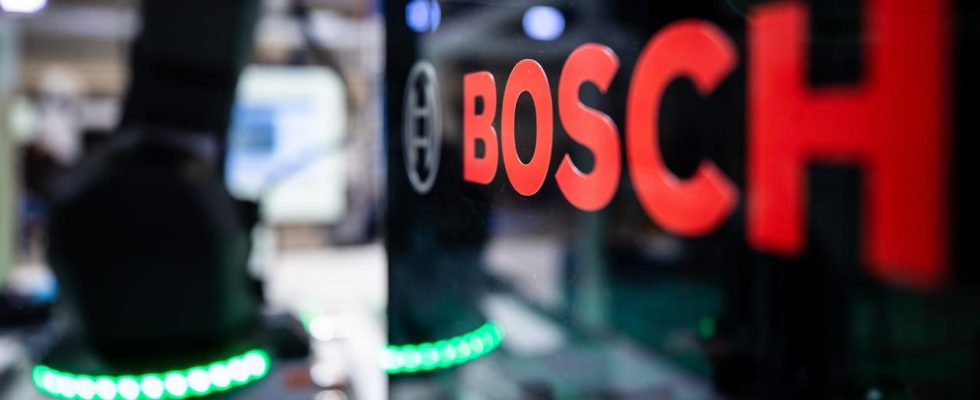background
The transformation takes its toll. Bosch, the world’s largest supplier to the automotive industry, has to cut staff. The resistance from the workforce is great.
Anyone who drives up to the so-called Schillerhöhe near Stuttgart, the headquarters of the Bosch Group, cannot help but notice that a lot of things are changing here. The main building of the company headquarters is completely scaffolded, the facade disappears behind red safety nets. Not only is the renovation going on here, it’s also being gutted. The old is being expanded to make room for the new.
This construction site can also be understood as a symbol of what Bosch currently has to do: repositioning the company to make it fit for the future. Managing director and labor director Stefan Grosch sums it up: “If the general conditions change, then we have to adapt. That’s exactly what we’re doing right now.”
Transformation leads to job cuts
The framework conditions are, on the one hand, the so-called transformation, i.e. the transition from classic combustion engines to electromobility. A political decision that has a significant impact on Bosch, the world’s largest supplier to the automotive industry. In addition, in the automotive sector there is a generally weak global economy, persistent inflation and negative exchange rate effects, which make the transition even more difficult, according to the group. The consequence: job cuts.
Up to 1,500 jobs could be lost in Germany in the drive division alone. In the business area, which deals with electronics and software for automated driving, around 1,200 positions are available worldwide, up to 950 of them in Germany. Another 500 jobs could be cut worldwide in the control unit division. And that’s just the automotive sector. In the power tools sector – i.e. tools – and in the household appliances segment, there are hundreds more jobs at stake.
So it’s no wonder that the union and the works council are up in arms. They have called for a big day of protest today and expect around 10,000 supporters to gather in front of the Bosch headquarters on Schillerhöhe. “You don’t build the future alone, you shape it together,” is the motto under which the employees are protesting against the planned job cuts.
Cuts not surprising
But in reality the cuts should come as little surprise. According to automotive expert Stefan Bratzel, director of the Center of Automotive Management (CAM), it has been clear for years that the transformation process will cost jobs: “These are very, very difficult times at the moment for the automotive industry in general and for the supplier industry in particular. We predicted years ago that the transformation would cost around 20 percent of jobs.” Bosch is not an isolated case, says Bratzel, and is still doing well in comparison when it comes to job cuts.
With more than 130,000 employees in Germany alone, the planned “personnel adjustment,” as Bosch puts it, is actually in the low single-digit range. However, it doesn’t happen lightly: “We don’t just lay people off,” says Labor Director Grosch, “that’s important to me. We do it very carefully and with a sense of proportion.” For example, employees in the mobility sector have concluded a “future agreement” with their employer in 2023, which excludes redundancies for operational reasons until the end of 2027.
Reacted too late?
Nevertheless, the question arises as to whether job cuts could not have been prevented in general. Did Bosch react too late to the transformation? Too hesitant to buy new horses? “Bosch is actually quite well positioned,” says automotive expert Bratzel. “Perhaps they were a little too slow when it came to switching to electromobility and networking, but that applies to the entire German automotive industry. Players from the USA and China have pushed this forward more strongly.” And you just have to deal with them now.
People at Schillerhöhe are also aware that Bosch’s future will not be decided solely in its founding country, Germany – especially since Germany is becoming an increasingly difficult place to do business. Rising energy prices, the shortage of skilled workers: There is a need for action on the part of politicians on these points.
International investments
We therefore want to invest more in international markets, says Grosch: “We have strong industrial expertise and innovative strength here in Germany. But growth is also taking place in other markets and with other customers. And accordingly, we will also go into these regions and take advantage of growth opportunities .”
Just last year, Bosch announced that it would invest almost one billion euros in a development center in China. A location for electromobility is currently being built in the Czech Republic. A strategy that is not well received by the German workforce given the threat of job cuts, but which the labor director defends: “We have to secure our competitiveness,” says Grosch. “This is the only way we can be fit for the future. And in the end, we will also secure employment here in Germany.”
The scaffolding in front of the company headquarters on Schillerhöhe will soon disappear. Next year, it is said, the gutting should be completed and the renovation complete. At least as far as the building is concerned. The substantive transformation of a global player like Bosch is likely to take much longer.

